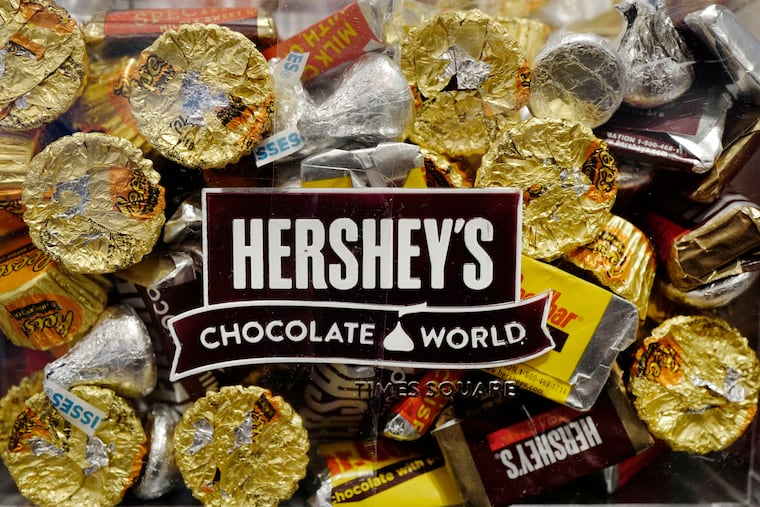Hershey Foods Corp. ‘shocked’ that its candy may be tainted by slave labor
This article originally appeared in The Inquirer on June 24, 2001.

This article originally appeared in The Inquirer on June 24, 2001.
Hershey Foods Corp., the nation’s largest chocolate-maker, is “shocked” and “deeply concerned” that its products, such as Hershey’s Kisses, Nuggets, chocolate bars and Reese’s Peanut Butter Cups may be tainted by slave labor, a company official said.
Hershey said it would help fund a study of labor practices on 2,000 cocoa farms in the Ivory Coast and 1,000 farms in Ghana. There are more than 600,000 cocoa farms in Ivory Coast.
The study will be coordinated by the U.S. Department of Labor and the U.S. Agency for International Development.
Revelations of indirect involvement with child slavery could be deeply embarrassing to Hershey, which has a long history of aiding children in this country. Hershey Foods is controlled by a school for orphaned and disadvantaged children, established in 1909 by company founder Milton S. Hershey and his wife, Catherine.
The Milton Hershey School in Derry Township near Harrisburg is a nonprofit residential school with about 1,000 students. It holds a controlling interest in Hershey Foods, which has a market capitalization on Wall Street of $8.4 billion.
Hershey Foods officials, who initially said they were unaware of slave labor in the cocoa trade, acknowledged recently that Ivory Coast slave labor was used to harvest some cocoa beans shipped to the United States.
"We're not going to sit here and say that it's not happening if the Ivorian government says that it is happening," said Robert M. Reese, Hershey Foods senior vice president. "It does change our focus a bit. "
The Ivorian government reported about a week ago that it had uncovered a slave-labor smuggling ring in the Ivory Coast central city of Bouake.
The government report confirmed a British television documentary broadcast in autumn on the widespread use of slaves.
"No one, repeat, no one, had ever heard of this," Reese said in an earlier interview. "Your instinct is that Hershey should have known. But the fact is we didn't know. "
Hershey buys cocoa beans from international traders and has no employees in the Ivory Coast, the company said.
After the British documentary was broadcast, Hershey asked U.S. and World Bank officials about slave labor in West Africa and were told that they were not aware of slaves in the cocoa fields, Reese said.
Hershey has not sent its own employees to the Ivory Coast to investigate slavery allegations because the U.S. government warned against traveling to the politically unstable nation, Reese said.
The study of cocoa-labor practices will be paid for by Hershey and other chocolate companies. It is expected to cost between $1 million and $2 million, said Larry Graham, president of the Chocolate Manufacturers Association. Chocolate companies will contribute through the World Cocoa Foundation in Vienna, Va., Graham said.
"We think this will go beyond what anybody else has done," he said. "As soon as we can get people in to do it, we will do it. "
"As an industry, we strongly condemn abusive labor practices, and our goal is to be part of the worldwide effort to solve this problem," Graham said in a prepared statement, as the trade association publicly announced its plan to study cocoa-farm conditions in Ivory Coast. "If one child is affected, that is one child too many. "
The Ivory Coast is the world's largest producer of cocoa beans, and many of the beans make their way into the United States - and ultimately into the hands of consumers - through the ports of Philadelphia and Camden.
In recent years, Philadelphia regained its position as the nation's leading port of entry for cocoa beans after port officials invested about $1 million in modernizing Pier 84, an abandoned fruit terminal in South Philadelphia.
Harvey Weiner, who operates the cocoa terminal, invested an additional $500,000 into Pier 84. Weiner owns or leases about 10 warehouses in the Philadelphia area for cocoa-bean stocks.
Weiner said the chocolate industry should consider building schools and hospitals, or provide other social services in those countries where it obtains cocoa beans.
According to the New York Board of Trade, the Philadelphia and Camden area had 1.7 million bags of cocoa beans in warehouses available for chocolate processing on Thursday. In the New York borough of Brooklyn, there were 893,691 cocoa-bean bags in warehouses; in Norfolk, Va., 553,055 bags were in inventory.
From the Philadelphia area, cocoa beans are shipped by rail or truck throughout Pennsylvania and New Jersey. In addition to Hershey, two large chocolate processors in the region are Blommer Chocolate in East Greenville, Montgomery County, and Mars Inc., in Hackettstown, N.J., and Elizabethtown, Pa.
Hershey has not considered boycotting Ivory Coast cocoa beans because that would hurt the legitimate cocoa-bean farmers who need to sell their produce, John C. Long, Hershey vice president for corporate communication, said.
Lower cocoa-bean prices helped Hershey earn higher gross profits in 2000, the company said in documents filed with the Securities and Exchange Commission in April. Hershey produced a gross margin in 2000 of 41.4 percent, compared with 40.7 percent in 1999.
Reese did not believe that slave labor in the Ivory Coast was tied to the collapse of cocoa-bean prices. Those prices are set by world supply and demand, he said. He said political turmoil in West Africa and mounting poverty were more likely culprits in the emerging slave trade.
Bob Fernandez’s e-mail address is bob.fernandez@phillynews.com.